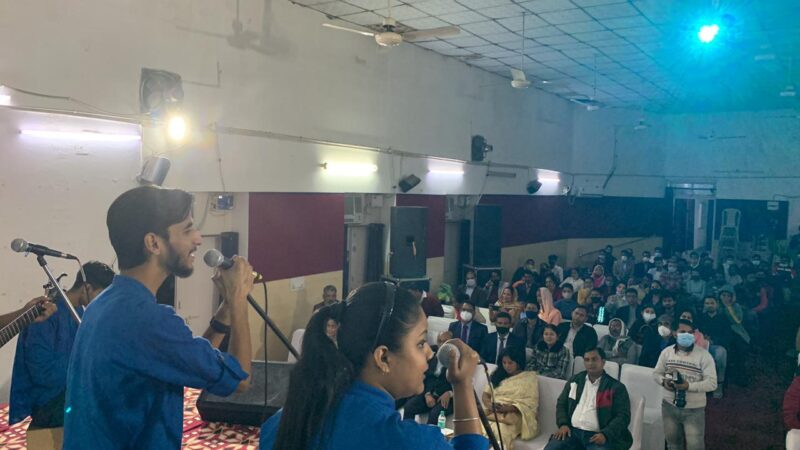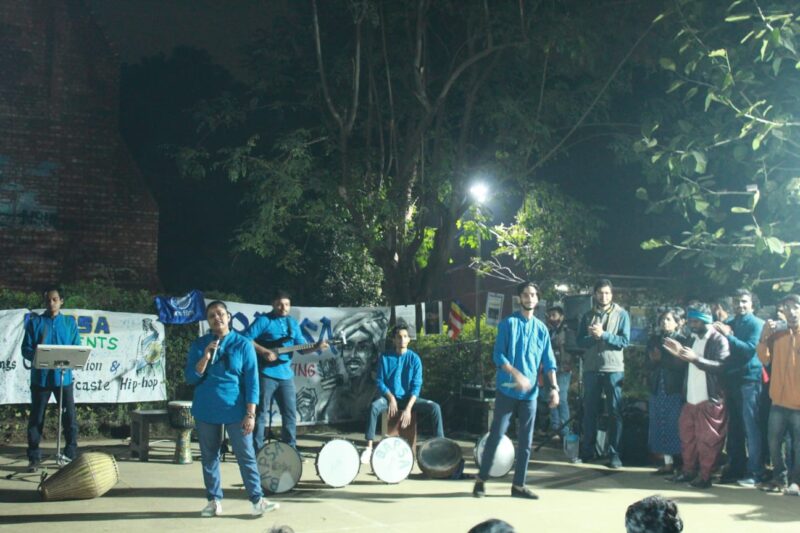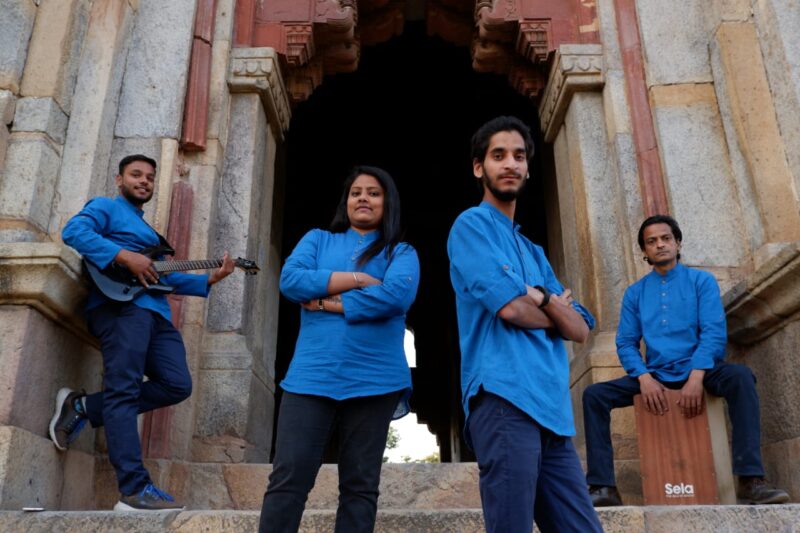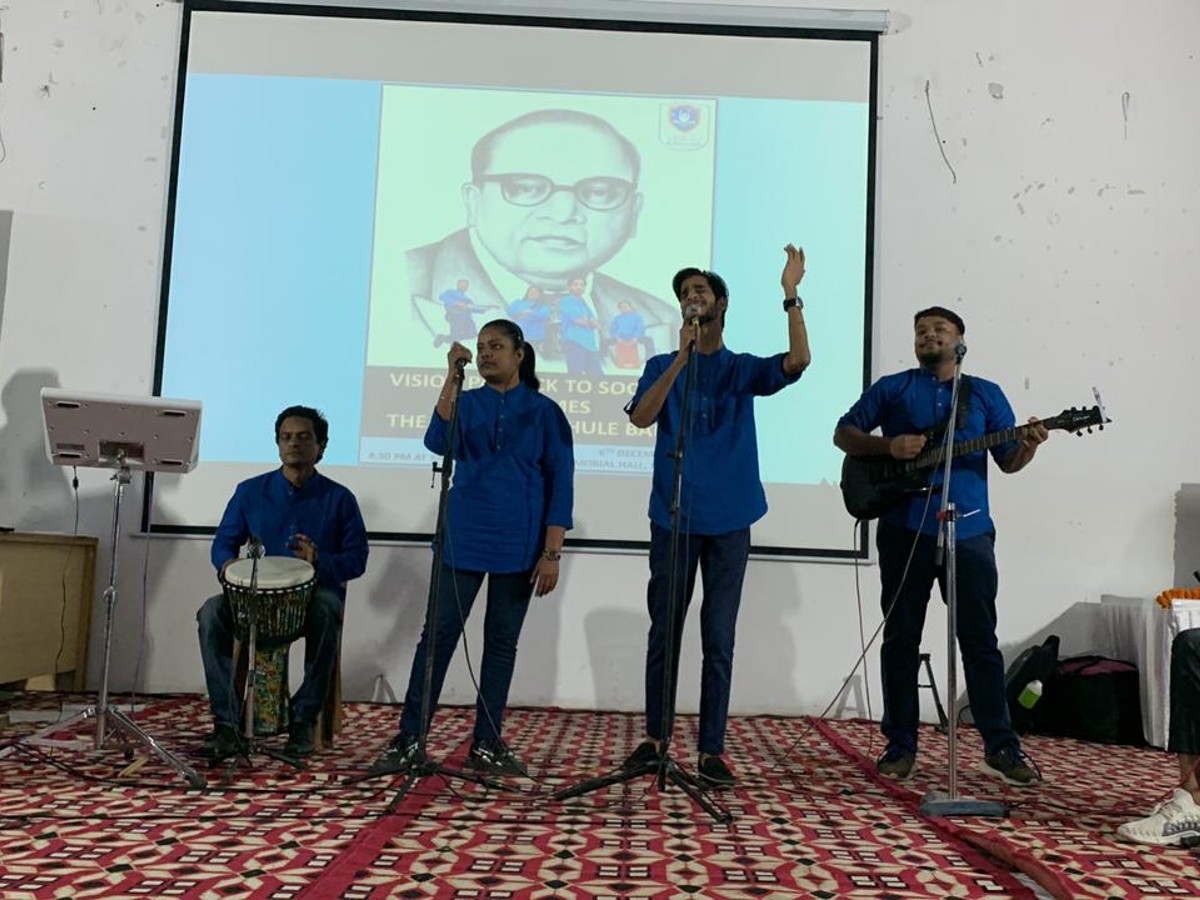“Music has the power to bring revolution, to change society. We wanted our community to know about our role models, the ones who have worked for marginalised castes, and music felt like a powerful mode of communication,” says Vijay Kumar, founder of anti-caste Savitribai Phule Band based in Karol Bagh’s Reghar Pura, a slum area largely inhabited by Dalit population.
“If someone who has been historically oppressed sings, you can hear the pain and suffering in their voice.”
Kumar’s words hold ground. The band sings compelling renditions of Kabir Das, the subaltern saint who often wrote about classless, casteless town Premnagar, the city of love and Suraj Pal Chauhan, a Dalit writer and poet.
The band also writes biographical songs about educationists Jyotiba Phule, Savitribai Phule, Fatima Shaikh and BR Ambedkar.
“Women in our area (Karol Bagh) are very much aware [about society] and ready to take action, and they were the first ones to participate in the band,” Kumar reflects.
It was started in 2016 as an all-women band and named Daughters of Savitribai. However, over the years, as female artists left the band due to societal limitations or marriages, male artists joined in and the band’s name was changed to Savitri Bai Phule Band.
As evident from the name, it takes its inspiration from Phule, who is also recognised as India’s first woman teacher.
Kumar tells Patriot that the band’s name was decided when Ideal Youth Health and Welfare Society, an NGO that worked for marginalised castes, was celebrating Teacher’s Day, the birth anniversary of Sarvepalli Radhakrishnan.
Band’s vision
“We invited Gurinder Azad, the editor of Round Table India, and he told the students about teachers who have worked for lower-caste people in India. This is when we thought that people here should know about the woman (Savitribai Phule) under whose light we have all been nurtured, especially women. That’s how it all started,” Kumar explains.
The vision of the band is to educate people about the historical injustice Dalit community has gone through and inspire the young population with the words of Dalit leaders. It talks about the intellectual legacy of lower-caste personalities whose labour helpedthe community gain emotional strength and dignity.

the Raja Ram Mohan Roy Memorial Hall
Kumar emphasises that the band’s target audience is people living in slums and it frequently performs in a number of slum areas in Delhi. The band has also been invited to college fests in Jawaharlal Nehru University, Delhi University, and Ambedkar University.
“A huge crowd joined us with time. Young kids, who drop out of school early, tell us that they continued education after listening to our songs. These songs create awareness and are inspirational, so people feel a sense of belonging with it,” says Kumar.
Aman Mandhotiya, a member of the band who plays guitar, joined the band in 2017.
He tells Patriot that he was unaware of his own social position as a Dalit when he joined the band. In the five years he has been associated with the band, he learnt about caste oppression, Ambedkarite ideology, Dalit-Adivasi movement that helped him understand his own place in society.
“If you are living in a city, you will not be able to make sense of how discrimination is practised. There is a Brahmanical system working in the country… You see it in the news [about caste atrocities] everyday that there is a lot of casteism practised in the country. So, we made songs as a way of passing on the message. We want to reach the community with the ideology of Ambedkarism,” says 21-year-old Mandhotiya, who wishes to become a professional drummer and is preparing for CUET.
Woman presence
Shilpa Tank, a 25-year-old lead vocalist who joined the band in the same year as Mandhotiya, says that performing in different areas and cities gave her a lot of confidence. The story of Savitribai Phule and her journey in educating young girls also motivates her to take up the struggle that Phule started.
“I always wanted to be a singer but it felt almost impossible. A lot of people used to taunt me for aspiring to become a singer. But my parents and the band always supported me. Now, whenever I perform live and get praises, I feel so proud of myself,” she says.

University
Like Mandhotiya, Shilpa was unaware of the history of Dalit leaders and came to know about it only through the band. The band allowed her to explore the places that she would otherwise not be allowed to enter as a woman. She credits her overall growth to the band and wants to continue to pass on the message to young girls in future.
“This band changed me. Not only it gave me emotional and intellectual strength, but also made me what I am today. If you saw me in the past, you would not recognise me because the band has changed me a lot,” says Shilpa, who works in a local firm that packs and dispatches mobiles.
“I just want to sing for those who cannot continue their education due financial problems, or those who feel unmotivated and drop out of school,” she says as she reflects about her own inability to study further due to financial constraints.
While financial difficulties and lack of resources are two major challenges that the band faces, there is one more obstacle: ‘the words of truth’.
Uneasy to digest
A lot of people in the community, Kumar says, find it hard to accept the truth about their material condition or the vulnerable condition they live in. The harsh and radical words of the poet Suraj Pal Chauhan, then, create unease in the audience.
“There are poems by the poet that speak about Dalit bastis in strong language, and people do not want to hear the truth,” says Kumar as he recited Ye Daliton Ki Basti Hai (This is a Dalit locality) by Pal.
Song Suno Kabir Ki Vani, a part of transmedia collaboration called Bura Na Milaya Koi by documentary filmmaker Fathima Nizaruddin, created the digital presence of the band.

The video, shot by Nizaruddin and Ihsan Iqbal, features band members Mandhotiya, Rohit Lawaria, Shilpa Tank and Suni Tank wearing blue as they sing the verses of Kabir Das.
“Chhookar khaya, chhookar dhoya, chhookar jag ko banaya; Kahe Kabir batlao phir achhoot kahan se aaya (Touch when you eat, touch when you wash, touch when you create; Kabir asks then ‘How can anyone be untouchable?’),” the band sings.
“The band’s energy and dedication are really infectious and I am a fan of their work. Their songs of resistance create a much-needed space in civil society to address the question of caste. I am a fan of their work,” says Nizaruddin, who also teaches at Jamia Millia Islamia’s AJK Mass Communication Research Centre.





